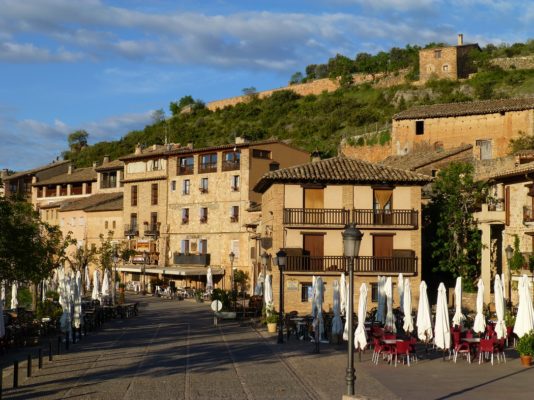See Travel Itinerary for a rationale of this trip, a who’s who of those travelling, and our itinerary.
Breakfast at our hotel, Villa de Alquézar, was excellent and the personnel very attentive. It was buffet style with a difference: individual tables were already set with a wide variety of foods: toast, breads, cured meats, local cheese, Spanish omelettes, cakes and pastries, any of which were replenished even without asking. Juices, tea and coffee were served as soon as we sat down. By the time we were finished we were ready to see Alquézar.
Set in the Sierra de Guara National Park in the province of Huesca, Alquézar is a beautiful brick and stone village spectacularly located on a ridge overlooking a gorge/ canyon cut by the River Vero.

There are many trails of varying difficulty or length leading from the village. You can get information from the local tourist office on the main street. John, Leslie, Andrew and Alex decided on a long walk, climbing first up above the village and then descending into the canyon. Margaret and I opted for a more leisurely stroll through the village.

Alquézar was a Moorish fortress (from the Arabic al-qasr) replacing an earlier Roman and Visigothic hill fort in the 9th century. It served as a defensive frontier post for the larger town of Barbastro located in the fertile Somontano plain to the south against Christians attacking from the Pyrenees. It was conquered by Sancho Ramírez, King of Aragón, in 1067 as the Christian wave southwards gathered momentum and the first rumblings of “crusades” started to be heard.
The Christians stamped their presence with the construction in 1099 of a Romanesque church on the same dramatic spur occupied by the now mostly ruined castle.

The Romanesque church was replaced in the 16th century by a Gothic building, better known as La Colegiata de Santa María la Mayor. Nevertheless, a beautiful Romanesque cloister was preserved.

To visit thecolegiata itself, you have to take a guided tour … well worth it.
************************
Our hotel was situated mid way between the more residential eastern part of the village with its narrow alleys and quaint Plaza Mayor (main square), and the western side consisting mostly of the main street into the village and its numerous cafes. Exiting the hotel, we turned first to the right and down towards the main street. The curve of the village faces south and receives the full impact of the sun. Golden-coloured brick and stone buildings housing restaurants, cafes, hotels, lined the north side of the street. Quaint chimney-pots, clay-tiled roofs and brown wooden balconies added a welcoming touch.


It was a beautiful, warm day with a few clouds high in the sky. On the south side, the 17th-century Iglesia de San Miguel (St Michael’s Church), stood surrounded by gardens and a profusion of olive and almond trees that descended to the Vero gorge.

In the lush grass between the olives there were goats chewing contentedly, and the air was filled with bird songs. It was an idyllic scene: the lush variety of greens, the curve of golden-hued buildings, the dramatic silhouette of the colegiata, and the goats and birdsong.

We next decided to walk to the colegiata, taking a terraced road that ran past San Miguel and along in front of the houses below the colegiata. It was a steep climb up to the colegiata, made a little easier by a series of ramps. The view from there was spectacular: the blue sky, the multiple greens of the vegetation extending in all directions, the warm hue of the buildings, and the grey of the massive cliffs edging the gorge. Beyond, a wooded plateau and distant hills.
On one corner, almost underneath the spur on which the colegiata stands, we found an excellent pastry shop. We couldn’t resist buying the local speciality, an anise flavoured pastry. It was delicious!
Diagonally across from the pastry shop was the small and irregularly shaped Plaza Mayor. It’s an attractive, inviting space, with warm brickwork, flowered balconies, and stone arcades to protect from summer heat and winter cold.
By now, Margaret and I were ready for a break. Our hotel was no more than 10 minutes from the Plaza Mayor, and once back we settled down on our balcony to await our adventurous foursome, John, Leslie, Andrew and Alex.
Below are photos they took on their trek.









